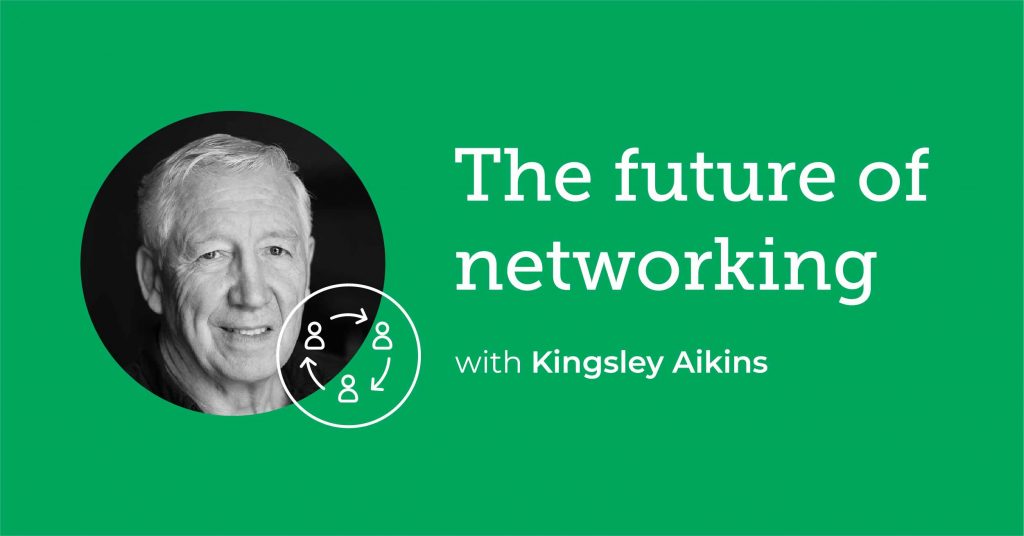The future of networking with Kingsley Aikins
The power networking exerts in creating change, both for businesses and individuals, cannot be underestimated. One conversation can literally alter the course of your life. But, with COVID pushing a large portion of the workforce online – how do you make sure you’re still networking successfully and efficiently over Zoom calls? And what does the future of networking look like?
We recently had the opportunity to chat with Kingsley Aikins, CEO of The Networking Institute, on this very topic. In his words, ‘networking is not a luxury, but a necessity – both professionally and personally.’ We need networks to thrive and survive, and while there have been changes to how we go about making connections, it’s not all bad news…

The benefits of tech
According to Kingsley, prior to COVID, networks didn’t shrink, they churned. Old contacts would drop off and be replaced by new ones. But this hasn’t been happening at the same scale during the pandemic. As we have been spending more time with our inner circle, there has been less impetus to find new connections. And this can most certainly impact career and job prospects. Yet, in tandem with this, Kingsley also acknowledges a new-found affinity for the scope of this burgeoning digital landscape. Thanks to technology we have become geographically unrestricted and can network anywhere with anyone, for free, and as Kingsley states: ‘I find free a very compelling price point for businesses.’ Zoom saves time, money and eliminates the carbon footprint associated with international travel for meetings. These are all huge benefits.
We now have the capacity to develop entirely new tribes of connections and as we move into the next phase of work, there is an opportunity to leverage both our traditional, existing networks AND this whole new cohort of digital contacts. COVID accelerated this transformation, and while tech won’t fully replace how we network, it can be a significant value-add when used like this.
Geography is history
‘Possibly for the first time ever, it’s more important what you do than where you are.’ Pushing on in this discussion, Kingsley accurately argues that the power geography had on our identities has now begun to dissipate. We have an option to live what he calls ‘hyphenated lives’ where we can exist in different locations and not be so firmly tied down. The pandemic, in many ways, has liberated networking as a function, Kingsley believes, turning the world into more of a mosaic than a melting pot. And this also allows you to bring a great deal more diversity into your zeitgeist of connections. But this doesn’t come without intention – you have to be in motion, putting your talents on display and talking to people.
Homogeneity is detrimental to a network. Diversity has to be embraced and sought. Kingsley states that the goal is to find ‘un-like minded people,’ people who will challenge your status quo and inspire difference. He even gave a wonderful example of how much the world is changing – 33% of the working population in Dublin weren’t born in Ireland. So if your network isn’t reflecting this, you need to start making some changes.

Maintain your network
One of the most important points Kingsley makes is in relation to auditing your network. Quoting Dunbar’s Number, a theory that the maximum number of relationships you can have at any one time is 150, Kingsley says it’s vital to keep tabs on your connections. Look at it in its entirety and note the following three components:
- Redundant connections
- Major gaps
- Dormant connections
Armed with this information, you can start to refresh and re-energize your network. During the pandemic, Kingsley made it a mission to reach out to one dormant connection every week. The result? A renewed knowledge about the strength of his network and the hidden value that resided within it. This activity allowed him to categorize and put shape on his network so he knew where action was needed, where opportunity could lie etc. As Kingsley so eloquently put it: ‘when business is down, you paint the shop.’ Now is absolutely the time to take stock and get prepared.
Networking is not about you
It’s a strong point to make, but one that informs so much of what Kingsley teaches. Networking is about giving. It’s about doing it on a consistent, daily basis and creating a habit around it. It’s not about you at all. Creating connections in vanity will not benefit in the same, powerful way that selfless networking can. When you give to individuals with no thought to return, it inevitably comes back to you in spades. This, according to Kingsley, is a fundamental component of building effective networks.
Networking can be a challenge though, as it often has a less-than desirable image. As Kingsley states, the noun ‘network’ sounds wonderful and positive, but the verb ‘networking’ conjures thoughts of inauthenticity. And it’s important to keep this in mind. Kingsley warns against mixing up sociability with a strong aptitude for networking. It’s not always the most extroverted characters, who spread their social capital thinly and try to impress, that are most effective. Kingsley argues that introverts, who listen and network with decency and integrity often build stronger connections. He even referenced the famed Dale Carnegie, stating that it is more important to be interested than interesting. And even in this era of tech, it still rings true.
The final word
As we move forward, Kingsley believes that we need to become more ‘intentional, strategic and thoughtful’ about how we network. While COVID has changed the working landscape, it’s still so important to develop, maintain and grow our connections. And while the mediums may change, it still has to follow a people-first approach. Kingsley left us with a final nugget of wisdom – ‘remember something small about people.’ It will ALWAYS pay dividends to be authentic and interested when networking.
